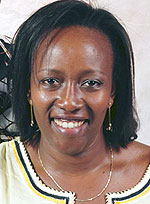WE watched in horror as Typhoon Haiyan hit the Central Islands of the Philippines early this month, the 20ft high water slamming onto land, destroying property, lives, and in the event, earning itself a place amongst the worst calamities of the decade.


WE watched in horror as Typhoon Haiyan hit the Central Islands of the Philippines early this month, the 20ft high water slamming onto land, destroying property, lives, and in the event, earning itself a place amongst the worst calamities of the decade.Perhaps the question in mind for most of us was why, with all these high technologies, there hadn’t been early warning mechanisms to avert extreme catastrophe, particularly in a country so prone to disaster.It is a helpless feeling in the face of calamity, and one wonders what would happen should it ever cross our path. It seems that science, with all its advancement, can only help alert, but not prevent natural disasters and even this has not yet been well mastered. In any case, science is part the reason for our problems. In trying to find solutions, it brings about more problems through the processes it takes, that end up creating these threats and hence the viscous circle again. Put it this way, man explores everything…the earth’s crust, the heavens, the seas, the ground we walk on, and in all cases, leaving pollution and worse destruction than that of the elements. We are even more obsessed with creating things that threaten our own existence, say nuclear products, ammunition and while at it, fighting, hating, and creating nightmares in our wake. Let’s say, the strength of man is in his ability to turn threats into opportunities by taking advantage of the weaknesses (so says the SWOT analysis). But since we have not yet had the opportunity to control the threatening elements or know which of their weaknesses to tackle, the solution for now lies in finding ways to protect ourselves when they happen, while bidding time for science to find more solutions. The saying goes that if you cannot beat them, join them. So as Rwanda strives to be a self –reliant, service-oriented economy, solution-seeking processes we must undertake, especially for a country that is still firming its roots. The recent Transform Africa Summit 2013 held in Rwanda, for example, set a new agenda for ‘Africa to leapfrog development challenges through the use and uptake of broadband and related services’. Hopefully, the changing climate and seasons were among the challenges discussed? The farmers in my village had an unexpected drought period in September that nearly destroyed all the grains they had just planted. As if that wasn’t enough, the first rains were such an onslaught that they ended up destroying nearly a quarter of what they had grown. Half the time during the rainy seasons, parts of the country are flooded causing credible loss particularly for food-crop growing farmers and destruction of their semi-permanent properties.The question is, should there be extreme weather in Rwanda, God forbid, do we have the capacity to minimize the loss of lives and property using the means we have? On a lesser scale, can farmers be more prepared for potential drought, flooding or landslides through early warning, or should we take it that this changing climate takes unexpected turns despite advanced science and technology?Disaster recovery is more costly than prevention, arguably perhaps. In the case of the Philippines, some think that the cost of re-locating the locals was something their government was unable to handle in terms of accommodation, feeding, transportation and other facilitation. On the other hand, perhaps this cost would have been nothing compared to the loss of human capital that would have been available to rebuild their homes? Or the orphans that have to be looked after? Or the urgent supplies that had to be flown in for victims that were much more desperate than else would have been? For a country that is disaster prone like the Philippines, there should have been better demonstration of preparedness for Typhoon Haiyan, and solution-seeking processes should well have commenced shortly after their first major disaster.Rwanda has demonstrated surprisingly efficient and effective responses to disaster. A step further would be to ensure that at any one time, it is as good as ready for natural calamities at whatever scale.The best preachers of our time are those who relate to the day to day problems we face in our lives. Likewise, the level of science and technology in Rwanda should relate to the people’s fears and concerns, particularly on global warming, and communicate more in-depth on how as a tool, it can be applied to provide solutions where people feel most helpless. I often say that ignorance is bliss, but in this case, having knowledge is forearmed.In the meantime, the struggle to reduce man’s effect on global warming continues, even as the Philippines cry foul and wars and fear of war still rage in this civilised world. We are all in God’s hands.The writer is a social commentator based in Kigali


